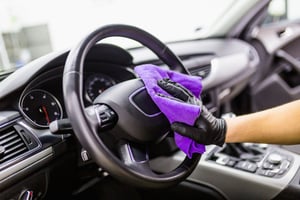
How To Properly Disinfect Your Vehicle Without Damaging The Interior
The COVID-19 pandemic has now reached all parts of New Hampshire. While government agencies work on such things as testing and treatment there is also a lot that we can all do to help prevent the spread of COVID-19 in our community. The CDC and other government organizations have provided recommended actions. It is important that we take this illness seriously, and that we take action in our homes and businesses.
PARTNER SPOTLIGHT
Dealer Management System, Computer Technology, Media/Advertising, Automotive Auction, F & I/Aftermarket Products, Automotive Technology Training & Compliance
 A NHADA Gold PARTNER
A NHADA Gold PARTNERComputer Technology, Automotive Shop Equipment, Environmental Services
 A NHADA Platinum PARTNER
A NHADA Platinum PARTNERF & I/Aftermarket Products, Automotive Technology Training & Compliance, Environmental Services
.png?width=150&name=corp_logo_horz_on_light_with_trademark_symbol_1200w%20(002).png) A NHADA Diamond PARTNER
A NHADA Diamond PARTNERF & I/Aftermarket Products, Financial Services, Automotive Technology Training & Compliance
 A NHADA Diamond PARTNER
A NHADA Diamond PARTNERMany dealerships and independent repair shops are receiving questions on what steps owners can take to disinfect their own vehicles. So we have put together a list of tips for how to clean and disinfect your car to prevent the spread of the Coronavirus. Vehicles often have many different surfaces and materials in their interior, and owners want to make sure they can clean their interior without damaging the materials.
We should note that we are not health experts, and that there are many additional precautions recommended by the CDC to prevent the spread of COVID-19. However, we all spend a lot of time in our cars, and it is important to make sure that it is a clean environment for you and your loved ones.
Be assured that auto dealerships and independent repair facilities are taking all precautions to both disinfect customers' cars and maintain a sanitary workplace.
We are proud to be part of the New Hampshire community, and want you to know we are taking this seriously. You can also count on us for clear communication, so please reach out with any questions or concerns.
Choosing Materials to Clean Your Car Interior
The first step to cleaning and disinfecting your car interior is to choose the cleaning agents and materials you will use. Depending on whether you have leather, cloth, or imitation leather upholstery, steps and cleaning agents will differ.
Isopropyl alcohol is a proven disinfectant, and is also safe to use on most car interior surfaces. In fact, it is used in many production plants to put a final touch on interior components before they are shipped out. Isopropyl alcohol will remove many stains, smudges and residues, as well as kill bacteria and viruses. However, that stain removing quality can also cause problems with leather.
If your vehicle has a leather interior, it probably has a thin protective coating to prevent discoloration. Isopropyl alcohol can deteriorate that coating and even remove the dye from the leather itself. We have instructions for cleaning leather surfaces below.
It is safe and easy to use isopropyl alcohol that is 70% or higher to wipe down hard surfaces in your vehicle. That includes steering wheel, dash, armrests, console, seat adjusters, shifter, cup-holders, doors, handles, and more. Alcohol is also suitable for cleaning the imitation leather used in some vehicles.
It is important to prioritize these "high touch" areas of your car when disinfecting. All wiping and cleaning should be done with a microfiber cloth if you have one available. Not only do they do a great job of trapping dirt, but they also prevent scratches.
High touch areas include:
- Grilles
- Knobs
- Rearview Mirror
- Door Handles
- Steering Wheel
- Gear Shifter
- Seatbelts
For Cleaning Leather Interior
For leather steering wheels, seating, and trim, a combination of soap and water is a safe and sufficient way to clean them. Do not scrub hard when cleaning your leather interior, and avoid excess suds and water. Hand washing has been recommended as a primary way to protect oneself against infection by COVID-19. This is not only because soap can kill the virus, but also because the friction of washing contributes. This holds true for washing your leather interior as well.
Steps for Cleaning and Disinfecting Car Interiors
While car interiors are built to be durable, hard scrubbing or using a rough cloth can cause scratches or even discoloration. A wipe with alcohol on hard surfaces and gentle circular cleaning on upholstery are the best bets for both cleaning and maintaining your car interior.
Don't use too much water on your seats. If cloth upholstery soaks through with water, it can get into the cushion beneath. This can cause the growth of mold and that musty smell you will recognize if you've left your car windows open in the rain.
If washing the seats of your car, it is best to wet a cloth or sponge with soap and water and wipe the seats. You do not want to leave excess soap or water, as it can take a long time to dry. Isopropyl alcohol can safely be used on non-leather seats, but it is not an ideal cleaning agent for those surfaces unless you have imitation leather.
If you are not sick, and haven't had anyone sick in your car, don't get too worried about doing this repeatedly. However, starting with a truly clean slate in your vehicle will certainly give you some peace of mind.
A common recommendation from experts is that once your car's interior is cleaned and disinfected, it is important to wash your hands before getting in from now on. This will help keep your car a clean place, and reduce the chance of a virus making it into your vehicle. The steering wheel is one of the dirtiest places in your car due to constant touching, and having clean hands will go a long way to keeping it in good condition after being disinfected.
If you believe you have had someone with COVID-19 in your vehicle, you should disinfect and call your doctor for next steps. They believe that the virus can survive in the air for up to three hours, and on surfaces for much longer, so it is best to be cautious if you believe your vehicle has been exposed.

















.png?width=150&name=Ally_Final%20Logos%20and%20Pairings_11.14.2018-01%20(2).png)


-2.png?width=150&name=Wipfli%20Logo%20Blue%20RGB%20(1)-2.png)


.jpg?width=150&name=NHADA_Partner_FTR_Img_NHADA_Insurance%20(1).jpg)


.jpg?width=150&name=NHADA_Partner_FTR_Img_JMA(1).jpg)








